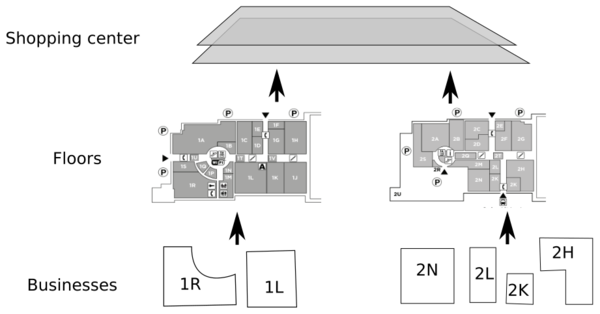Difference between revisions of "Proximity area"
(→Proximity area) |
|||
| (18 intermediate revisions by 4 users not shown) | |||
| Line 1: | Line 1: | ||
| − | Things have a | + | Things have a field '''proximity area''' that allows several things to be linked according to their proximity or expressing some kind of containment, for instance, when a thing is contained into another. For example, in a shopping center with several businesses divided in two levels we can use three types of things as each business can have its proximity area pointing to a floor which points itself to the thing that represents the shopping center. |
| − | + | [[File:exampleProximityArea.png|600px]] | |
| + | Other example are countries which are pointed by country states or provinces which in turn are pointed by municipalities, cities, etc. | ||
| + | |||
| + | The proximity area field can be used for '''inroom''' location where there is no access to GPS location or there is not enough precision. A proximity sensor can update this property for every thing it "sees". | ||
| + | |||
| + | For instance | ||
| + | An RFID antenna-1 is located on an entry door of thing "room-1". We could arrange that every tag detected by the antenna will update the corresponding thing by setting its '''proximityarea''' to point to "room-1". | ||
| + | |||
| + | These changes can be done using a reasoner (See [[Reasoner proximity Area|Reasoner proximity Area]]) or even by the observation enrichment (See [[Sensor's network#Proximity updates|Proximity updates]]) | ||
| + | |||
| + | '''Important!''' | ||
| + | |||
| + | The proximity area field is for proximity based services and sensors. ''Proximity'' and ''Location'' concepts are related: | ||
| + | - If you know the location of two things or places (say A, B), then you can determine how proximate they are (or how close they are). | ||
| + | - Moreover, if you have thing or place (A), and you can detect that (B) is "near" or proximate to (A), then you may also be able to derive some location information for (A). | ||
| + | |||
| + | However the two concepts are very different (see for instance this [https://www.quora.com/What-is-the-difference-between-proximity-based-services-and-location-based-services page]) and in the AMTech platform, both services are provided but they are not used together: | ||
| + | - Proximity fields can not be used in spatial (location) based parameters | ||
| + | - Location can not be used to set a proximity area based parameter | ||
Latest revision as of 12:59, 23 December 2016
Things have a field proximity area that allows several things to be linked according to their proximity or expressing some kind of containment, for instance, when a thing is contained into another. For example, in a shopping center with several businesses divided in two levels we can use three types of things as each business can have its proximity area pointing to a floor which points itself to the thing that represents the shopping center.
Other example are countries which are pointed by country states or provinces which in turn are pointed by municipalities, cities, etc.
The proximity area field can be used for inroom location where there is no access to GPS location or there is not enough precision. A proximity sensor can update this property for every thing it "sees".
For instance
An RFID antenna-1 is located on an entry door of thing "room-1". We could arrange that every tag detected by the antenna will update the corresponding thing by setting its proximityarea to point to "room-1".
These changes can be done using a reasoner (See Reasoner proximity Area) or even by the observation enrichment (See Proximity updates)
Important! The proximity area field is for proximity based services and sensors. Proximity and Location concepts are related: - If you know the location of two things or places (say A, B), then you can determine how proximate they are (or how close they are). - Moreover, if you have thing or place (A), and you can detect that (B) is "near" or proximate to (A), then you may also be able to derive some location information for (A). However the two concepts are very different (see for instance this page) and in the AMTech platform, both services are provided but they are not used together: - Proximity fields can not be used in spatial (location) based parameters - Location can not be used to set a proximity area based parameter
